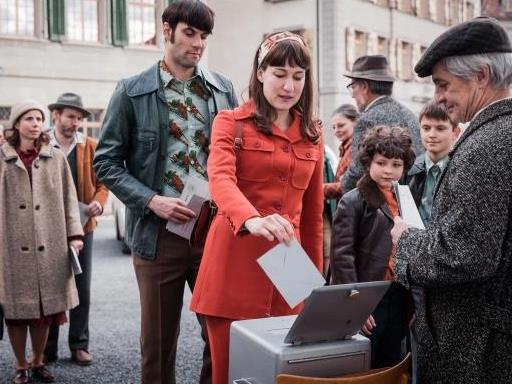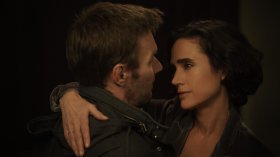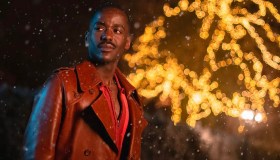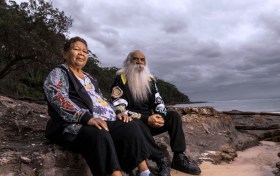Image: A scene from The Divine Order, a film by Petra Volpe.
Women in Switzerland didn’t get the right to vote until 1971, almost 80 years after New Zealand became the first country to introduce female franchise in 1893. Set in a remote Swiss village, The Divine Order, a film by Swiss screenwriter and director Petra Volpe, tells the tale of an ordinary housewife’s development into a political activist.
The narrative opens just before February 7th, 1971, when Swiss men went to the polls to decide on women’s suffrage. Life for quiet, unassuming Nora Ruckstuhl (Marie Leuenberger, winner of a Best Actress award at Tribeca) and the rest of the women in her community follows paths as traditional as hundred-year-old goat tracks: women look after their families, serve the menfolk, and are expected to remain in their subservient place, oppressed by legal and cultural inequity.
When Nora’s teenaged niece Hanna (Ella Rumpf) is slut-shamed by the village, made a ward of the state and incarcerated for running off with her boyfriend, and Nora’s husband Hans (Max Simonischek) refuses to allow her to get a job, Nora sense of justice is inflamed. Courageously she begins to challenge the dominance of the menfolk and finally rouses the village women to take a stand by going on strike. Nora is supported by sister-in-law Theresa (Rachel Braunschweig), by former bar owner Vroni (Sibylle Brunner), and Italian newcomer Graziella (Marta Zoffoli), who is on the receiving end of some old-fashioned racism.
Plenty of Swiss women at the time opposed universal suffrage. In interviews writer/director Volpe talks about internalised sexism, and how conservative family values, class and privilege obstructed the push for women’s right to vote. The character of Mrs. Dr. Wipf (Therese Affolter) stands for the ‘entitled’ Swiss woman reluctant to share the power breakfast table with her sisters.
The strike action on the part of the women backfires with sad consequences which nevertheless lead to an event where Nora finds her voice and forces her community to face its double standards. Along with the demand for political equality comes Nora’s understanding of her personal privations. One scene has Nora and her cohorts at a workshop (once known as a ‘consciousness raising group’) in Zurich ‘finding themselves’ in specific ways, a moment in the film handled with graceful levity.
I couldn’t help comparing this film with the US film Hidden Figures (about the unsung contribution to the work of NASA by black women scientists), earnest and laboured in its story telling, with an obviously feel-good, overly self-conscious weightiness. In contrast, The Divine Order is delicately handled, gently humorous in parts and tells its important story lightly. ‘Charming’ and ‘nuanced’ are words overused in reviews but are the right ones to describe The Divine Order. It has already garnered awards aplenty including Audience Award for Best Narrative Film at the Tribeca Film Festival and is in the running for a 2018 Oscar for best Foreign Language Film.
I took a friend to see The Divine Order; she was living in a village on the Swiss-Italian border at the time of these events, with women who were involved in the campaign for Swiss women’s franchise. She confirms how The Divine Order is flawless in its recreation of the time: the mood, the slow pace of life, the tone, the characterisations. None of the characters are ridiculed, the politics are presented without any ringing of polemical chimes and the personal-as-political narrative includes compassionate insights into everyone’s investment in either challenging or maintaining the status quo. We both cried and laughed. ‘I’m not usually as emotionally engaged as this,’ my friend said. Me neither. While eschewing overt emotional string-pulling, The Divine Order is beautiful and affecting.
Rating: 4 ½ stars out of 5
The Divine Order
CAST
Nora: Marie Leuenberger, Hans: Max Simonischek, Theresa: Rachel Braunschweig, Vron:i Sibylle Brunner, Graziella: Marta Zoffoli, Magda: Bettina Stucky ,Gottfried: Peter Freiburghaus, Mrs. Dr. Wipf: Therese Affolter, Hanna: Ella Rumpf, Werner: Nicholas Ofczarek, Indra: Sofia Hel
CREW
Writer & Director Petra Volpe Producers Reto Schaerli Lukas Hobi Cinematographer Judith Kaufmann Editor Hansjörg Weissbrich Music Annette Focks Production Designer Su Erdt Costume Linda Harper Make-up Jean Cotter Sound Patrick Storck Head of Production Claude Witz Production Manager Sarah Bossard Casting Ruth Hirschfeld Corinna Glaus
A Zodiac Films Production
Switzerland • 2017 • 97 minutes • Digital • 1:2.35 (Cinemascope) • Dolby Digital 5.1 In Swiss-German with English subtitles
Actors:
Director:
Format:
Country:
Release:





